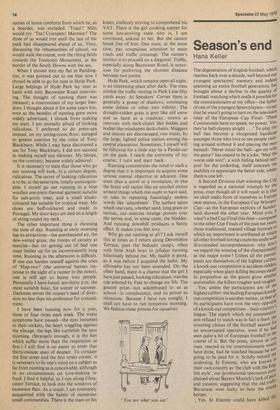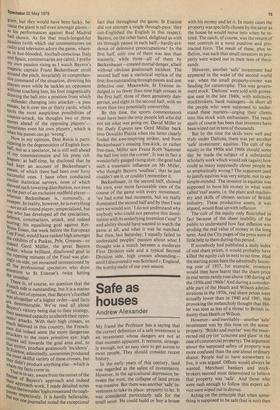Season's end
Hans Keller
The degeneration of English football, which reaches back over a decade, well beyond out
youngest spectators' memory and indeed spanning an entire football generation, has brought about a decline in the quality Of football watching which made it possible for the commissionaire at my office—the father of one of the youngest Spurs players—to saY that he wasn't going to turn on the television relay of the European Cup Final: 'These
Continentals have no speed, no power. Yes,
they're ball-players alright ...' To play the ball has become a recognised handicap amongst those who love to see people rush' ing around without it and playing the man instead: 'Never mind the ball—get on with the game!' has ceased to be a joke. `May the worse side win !', a wish hiding behind sun' port for the underdog, itself conceals the inability to appreciate the better side, where there is one left.
A Second Division club winning the CUP is regarded as a national triumph by the
press, even though all it will result in is that
we shall make fools of ourselves in EuroPe, next season, in the European Cup Winners
Cup—as the European exploits of Sunder'
land showed the other year. Mind you, it wasn't a bad Cup Final this time--compare to the other Cup Finals of the past ten years'
those traditional, massed village festivals 10 which an importance is attributed at whiCh
all other football-loving countries smile with ill-concealed incomprehension: why don't we regard the winning of the championshiP
as the major event ? Unless all the partici'
pants are themselves of the highest calibre, a knock-out competition is accident-ridden,
especially when giant-killing becomes easier
in proportion as the giants grow smaller and smaller, the killers tougher and tougher' . Yes, unless the participants are of the highest calibre : the leading European knock.:
out competition is another matter, in that all
its participants have won the very oPPosit,e of a knock-out competition—their countrY 5 league. The match which my commission aire refused to watch was in fact a feast, ther towering climax of the football season fcli an uncorrupted spectator, even if he hte seen quite a bit of European football in tne course of it. But the press, almost as ctrlid man, reacted as my commissionaire wnli s have done, had he watched because he going to be paid for it. Solidly behind n!li underdog, St Etienne, who are known I their own country as 'the club with the Eng' lish style', our professional spectators clanTe plained about Bayern Munich's lack of Pt, and passion, suggesting that the old cranig Bavarians were lucky to beat the Y°1-1r1 heroes. , Yes, St Etienne could have killed the giant, but they would have been lucky, because the giant is tall even amongst giants— as his performances against Real Madrid had shown. As for that much-longed-for Passion (with which our commentators on radio and television adorn the game, whereas in hot-blooded, football-conscious Italy and Spain, commentaries are calm), I prefer MY own passion rising as I watch Bayern's majestic captain Franz Beckenbauer stroll around the pitch, invariably in comprehensive command of the situation, directing his Players even while he tackles an opponent Without touching him, his foot magnetically drawing the ball into a position from which —defender changing into attacker—a pass ensues, be it over ten or thirty yards, which sPots the most auspicious possibilities of counter-attack, his thoughts two or three Moves ahead of the opposing players'— sometimes even his own players', which is
When his passes can go 'wrong'. Now in my opinion, Don Revie is parti
cipating in the degeneration of English football, but as a spectator, he is still well ahead of my commissionaire and his press col, Leagues : at half-time, he disclosed that he had kept an account of Beckenbauer's Passes, of which there had been. over forty successful ones. I have often conducted Similar statistical surveys, none of which Showed such towering distribution, not even on the Part of an exclusive midfield player— whereas Beckenbauer is, nominally, a sweeper. In reality, however, he is everything
not an all-round player, unspecialised, but
nne who has developed all the specialities, defence construction, attack, and indeed A;oriug: his equalising goal against RotWeiss Essen, the week before the European CLIP Final, would have ranked high amongst the exhibits of a Puskas, Pele, Greaves—or Indeed Gerd Muller, the great Bayern tstriker, whose brilliant, disallowed goal in h
oPening minutes of the Final was glar
41glY on-side, yet remained unmentioned by all the professional spectators who drew attention to St Etienne's twice hitting the crossbar. There is, of course, no question that the t'french side is outstanding, but it is a matter o Was not of opinion, that Bayern's football
as altogether of a higher order—and facts are w
demonstrable. We've read all about thaZern's victory being due to their strategy, :''r seasoned capacity to absorb their opponvnts' attacks. With their high crosses, so much in this country, the Frenchindeed seem the more dangerous cr ackers to the more primitive eye : high dsses sail towards the goal area and, to sntat extent, produce goalmouth 'incidents'. E the Lienne, admittedly, sometimes produced the
most skilful variety of these crosses, but wheY didn't produce anything else—which is nlY facts come in. oatis to Say. aware from the outset of the sse
Lueir a of Bayern's approach and indeed abou, PProach work, I made detailed notes L thetwosides'highcrossesand through Passes r but esPectively. It is hardly believable, not n -ne journalist noted the exceptional
fact that throughout the game, St Etienne did not attempt a single through-pass: they out-Englished the English in this respect. Bayern, on the other hand, delighted us with six through passes in each half—hardly evidence of defensive preoccupations! In the first half, only one of them was less than masterly, while three—all of them by Beckenbauer—created mortal danger, albeit without obvious goalmouth incident. The second half was a statistical replica of the first: five outstanding through passes and one defective one. Meanwhile, St Etienne indulged in no fewer than nine high crosses in the first half, three of them genuinely dangerous, and eight in the second half, with no more than two potentially convertible.
By this time, the sports commentators must have been the only people left who did not see what was going on. David Miller in the Daily Express saw Gerd Muller back into Oswaldo Piazza when the latter clearly fouled the awe-inspiring striker, and from Beckenbauer's ensuing free-kick, or rather free-pass, Miller saw Franz Roth 'hammer the ball low into the corner'. It was in fact a wonderfully gauged rising shot : the goal had such a traumatic influence on Mr Miller, who thought Bayern `soulless', that he just couldn't see it, or couldn't remember it.
Beckenbauer, in the second half, showed his own, ever more favourable view of the course of the game with every movement : 'we had some bad moments, but we really dominated the second half and by then I was sure we would win.'! do not understand why anybody who could not perceive this domination with its underlying invention ('soul'!) and ability should have wanted to watch the game at all, and what it was he watched. But then, last Saturday, I equally failed to understand peoples' passion about what I thought was a match between a moderate First Division side and a typical Second Division side, high crosses abounding— until I discovered it was Scotland v. England, the worthy nadir of our own season.



































 Previous page
Previous page